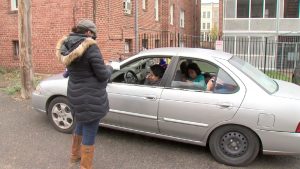Our studies found many ways that nuisance laws harm battered women, including the following[1]
Nuisance laws discourage battered women from calling 911 for protection from the abuse. Tina explained why she delayed calling until the situation became dire:
I called the police and I said, “I just had to call the police because he caught me comin’ in or out of my apartment like three days in a row and jumped on me.” I was all upset. I can’t take any more. I can’t even open my door to go out for work, and he’s attackin’ me. He’s hidin’ in the bushes…. [The police officer] told me, “He jumped on your three days in a row and you’re just now callin’ us? Why didn’t you call the first day?” And that’s when I told her, “I lost my apartment because of the nuisance law. I’m scared to call the police. That’s how I lost the other apartment, so I’m tryin’ not to call the police. –Tina
Nuisance laws also have a chilling effect on people’s ability to call 911 for any reason, which is especially dangerous for women who live in high-crime  areas:
areas:
If somebody breaks in my house, I feel like I can’t call the police. I feel like I can’t call for anything! I feel like I’m going to get in trouble for it. …That’s basically what the landlord told me. “If you call the police, you’re going to lose your apartment.” –Crystal
The inability to call 911 not only puts battered women in greater danger from their partner’s violence, but can cause the violence to escalate.
Sometimes it escalates because the abuser feels like there is now no check on his use of violence. Cindy described her boyfriend’s reaction this way:
He punched me in my face and I fell over the chair, broke the chair. He tried to choke me to death, but somehow, some reason, I was able, where I had nails and try to scratch, to get him off of me, he’s choking me. And I couldn’t call the police. Everything that has been going on, can’t call the police. So I think [my boyfriend] is taking advantage of that. –Cindy
Sometimes the violence escalates because the women feel like they now have to fight back to defend themselves:
I don’t feel like the police are gonna protect and serve ME. I feel like basically I have to take matters in my own hands and handle it myself. –Tara
Enforcement often triggers battered women’s evictions from their apartments, often with little or no advance notice.
Many end up homeless and have to go to emergency shelters, live in their cars, couch surf with friends and family, or live apart from their children. After her eviction, Bobbie moved from place to place during one particularly frigid winter and eventually ended up living in her car:
 [Interviewer: So to clarify, … your younger children wanted to be with you but you didn’t take them with you. Is that right?] Yes, ma’am. They was with me [at first] but, after I was staying in the car, I didn’t want my kids to be sleeping in a car. I figured like I could, but it was dangerous for ME, [so] it would also be dangerous for them also. So I made them stay with relatives and friends, because I didn’t want to drag them out…. And it was kinda cold then, too, when that was goin’ on. –Bobbie
[Interviewer: So to clarify, … your younger children wanted to be with you but you didn’t take them with you. Is that right?] Yes, ma’am. They was with me [at first] but, after I was staying in the car, I didn’t want my kids to be sleeping in a car. I figured like I could, but it was dangerous for ME, [so] it would also be dangerous for them also. So I made them stay with relatives and friends, because I didn’t want to drag them out…. And it was kinda cold then, too, when that was goin’ on. –Bobbie
Eviction often triggers or exacerbates existing mental and physical health problems.
When we interviewed Bobbie, she was wearing a medical boot from surgery because she has diabetes and, after her eviction, was not able to get the medical care she needed:
During that time when [I was homeless and] I first started getting the blisters and all that, they wanted to send a home health nurse out. Well I couldn’t get a home health nurse because I didn’t have any address to send a home health nurse [to], to come out and make sure to check my blood and do whatever it was supposed to be done. I couldn’t GET that because I didn’t have an address. –Bobbie
Eviction can compound the trauma of the abuse itself, and can send some women into an emotional tailspin. After being raped by her abuser and then evicted because of a nuisance ordinance, Dean fell into a deep depression and tried to commit suicide:
[B]y then, well, I was trying to black out what had happened with the rape. I didn’t want to think about that and the fact that I was being evicted. –Dean
Nuisance laws force many women into chronically unstable and unsafe housing situations.
The nuisance designation on their rental histories is one reason they have trouble finding a new place to rent:
[The landlords] all have a contract with the city under the new law. So that’s part of their lease now and that’s one of the things they’re gonna look [at]. If peace disturbance or anything that has to do with nuisance is in your background check. And I didn’t even know that. I was like, “What??? So I can’t get an apartment because of a peace disturbance?” And [one landlord] was like, “Yeah, it’s part of it now.” –Crystal
A nuisance eviction also causes battered women to lose any government housing subsidies they might have. This can have devastating consequences for their ability to secure housing in the future. Danielle explained why she stopped calling 911 even though she was in danger:
If I lose this apartment, then I won’t ever be able to get into another low-income apartment. –Danielle
The focus of enforcement is on the victim’s calling 911, not the abuse. This shift in focus perversely obscures the real crime of intimate partner violence and protects the perpetrator:
I think that [the police] basically just look at YOU like you’re the nuisance, even though you didn’t start it. To me, it seems like they’d rather protect the guy that did it to you than be bothered with you calling. –Dean
Nuisance laws hold battered women accountable for the abuse and its consequences. This puts battered women in an untenable situation, with no acceptable alternatives:
It’s like we didn’t have, it’s like I didn’t have no one to turn to, no one to call. You know? I was always told that the police was supposed to help and protect. But I felt like I couldn’t call because the landlord was like, “Don’t call.” And then when the police was like, called again, I was gonna get locked up. And what other option did I have? –Candace
[1] All names are aliases chosen by the interviewees.